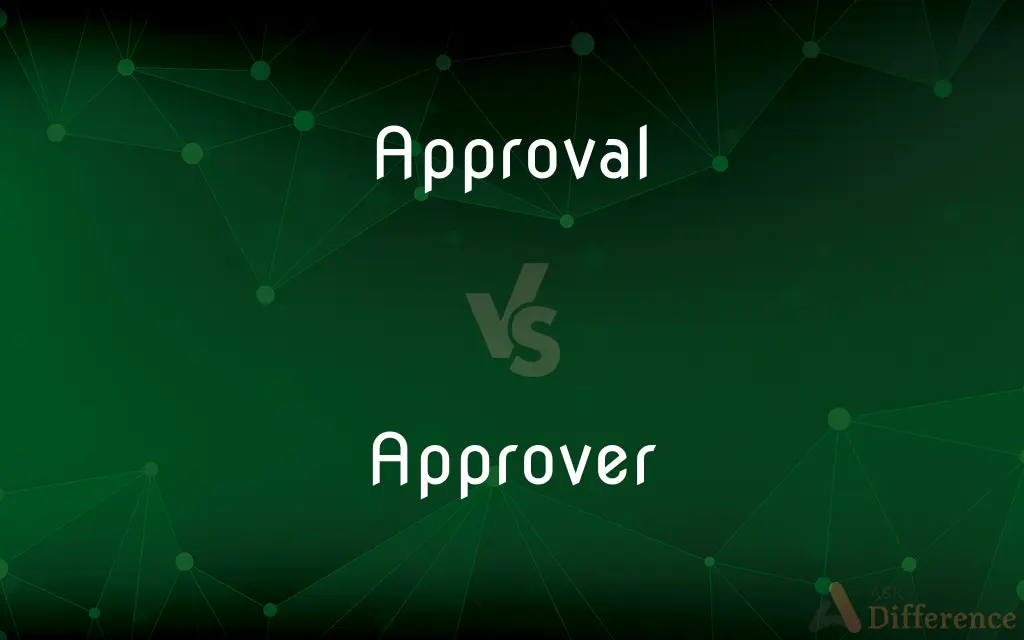Approval vs. Approver — What's the Difference?
By Tayyaba Rehman & Fiza Rafique — Updated on March 30, 2024
Approval is the act of accepting or endorsing something, while an approver is the person or entity that gives this acceptance or endorsement.

Difference Between Approval and Approver
Table of Contents
ADVERTISEMENT
Key Differences
Approval is a process or state where a concept, item, or action is accepted as satisfactory or meets certain standards. It signifies consent or agreement from a relevant authority or individual. Whereas an approver is specifically the individual or authority who grants this approval. They play a crucial role in the process by evaluating and deciding whether something meets the required criteria.
Approval often comes in the form of a formal acknowledgment or sanction, highlighting that something has been reviewed and deemed acceptable. On the other hand, the approver is responsible for carrying out this review process, making a judgment based on set criteria or personal discretion.
In many contexts, approval is sought to move forward with projects, ideas, or actions, indicating its role as a gateway or prerequisite. Meanwhile, the approver stands as the gatekeeper, whose endorsement is necessary for progression.
Approval can be seen as a status or condition that is achieved, which reflects a positive evaluation or acceptance. In contrast, the approver is the agent of this condition, actively participating in the evaluation that leads to approval or disapproval.
The nature of approval is passive, being the outcome of a process. Conversely, an approver is active, initiating actions or decisions that result in the granting or withholding of approval.
ADVERTISEMENT
Comparison Chart
Definition
The act of accepting or endorsing something as satisfactory.
The person or entity that gives acceptance or endorsement.
Role
Outcome or status achieved after evaluation.
The evaluator who decides if the status or outcome is met.
Nature
Passive, being the result of a process.
Active, initiating the approval process.
Contextual Importance
Serves as a gateway or prerequisite for actions or projects.
Acts as the gatekeeper, making crucial decisions.
Example of Operation
A project receiving approval from a board.
A board member reviewing and approving a project.
Compare with Definitions
Approval
Official permission or agreement for an action or decision.
The project cannot commence without formal approval from the committee.
Approver
Someone who evaluates and decides the acceptability of something.
As the project approver, she has the final say on any changes.
Approval
The act of validating or certifying something as acceptable.
After thorough testing, the drug finally gained FDA approval.
Approver
A person who authorizes or endorses something officially.
The approver for the budget increase is the department head.
Approval
Positive evaluation of something based on set criteria.
His novel received widespread approval from critics.
Approver
An official who sanctions or agrees to certain terms or conditions.
The financial approver ensured the funds were allocated appropriately.
Approval
An expression of favorable opinion or liking.
Her presentation received nods of approval from the audience.
Approver
A person who provides validation or support for an idea or action.
He became the key approver in the committee for innovation projects.
Approval
Acceptance of a plan or idea by the relevant authorities.
We're waiting for regulatory approval before launching the product.
Approver
An entity responsible for giving the green light to proposals or plans.
The regulatory body acts as the approver for new medical devices.
Approval
The act or an instance of approving.
Approver
One who approves or gives approval.
Approval
An official approbation; a sanction.
Approver
In English common law, a person who accuses a confederate; one who commits approvement.
Approval
Favorable regard; commendation.
Approver
One who approves. Formerly, one who made proof or trial.
Approval
An expression granting permission; an indication of agreement with a proposal; an acknowledgement that a person, thing, or event meets requirements.
I need to get an approval on this purchase order.
Approver
An informer; an accuser.
Approval
An expression of favorable acceptance and encouragement; a compliment that also condones.
Words of approval never seem to come from him.
Approver
One who confesses a crime and accuses another. See 1st Approvement, 2.
Approval
Something mailed by a seller to a collector to match their stated interests; the collector can approve of or return the item.
Approver
A bailiff or steward; an agent.
Approval
Approbation; sanction.
A censor . . . without whose approval n capital sentences are to be executed.
Approver
An authority with power to approve
Approval
The formal act of giving approval;
He gave the project his blessing
His decision merited the approval of any sensible person
Approval
A feeling of liking something or someone good;
Although she fussed at them, she secretly viewed all her children with approval
Approval
Acceptance as satisfactory;
He bought it on approval
Approval
A message expressing a favorable opinion;
Words of approval seldom passed his lips
Common Curiosities
What is approval?
Approval is the consent or positive sanction of something, indicating it meets certain standards or requirements.
Who is an approver?
An approver is a person or authority that gives approval, making a judgment based on criteria or personal discretion.
Can an approver withhold approval?
Yes, an approver has the authority to withhold approval if something does not meet the required criteria.
Is approval always formal?
While approval is often formal, especially in organizational or legal contexts, it can also be informal, such as social or familial acceptance.
Can approval exist without an approver?
No, approval inherently involves an approver who evaluates and decides on the acceptance of something.
What happens after approval is granted?
Once approval is granted, the approved project, idea, or action can proceed to the next stages of implementation or development.
Is the role of an approver limited to formal settings?
No, approvers can operate in both formal and informal settings, wherever approval is required.
How does approval impact the progression of projects or ideas?
Approval is often a prerequisite for moving forward, acting as a gateway that allows or restricts progression.
Can the decision of an approver be overridden?
Depending on the context, the decision of an approver may be subject to review or appeal, potentially being overridden by higher authorities.
What qualities should an approver possess?
An approver should be fair, objective, knowledgeable about the criteria, and able to make informed decisions.
Can approval be revoked?
Yes, approval can be revoked if the conditions under which it was granted change or if new information comes to light.
What responsibilities does an approver have?
An approver is responsible for evaluating proposals, ensuring they meet set standards, and making informed decisions regarding their approval.
How do different cultures view approval?
Cultural norms and values significantly influence the process and perception of approval, with some cultures placing more emphasis on formal approvals than others.
What is the significance of public approval in social contexts?
Public approval can significantly affect social trends, public figures’ reputations, and the success of products or ideas, reflecting the collective endorsement or disapproval of society.
How is approval communicated?
Approval can be communicated in various ways, including formally through documents and letters, or informally, such as verbal consent.
Share Your Discovery

Previous Comparison
University vs. Campus
Next Comparison
Pastor vs. PriestAuthor Spotlight
Written by
Tayyaba RehmanTayyaba Rehman is a distinguished writer, currently serving as a primary contributor to askdifference.com. As a researcher in semantics and etymology, Tayyaba's passion for the complexity of languages and their distinctions has found a perfect home on the platform. Tayyaba delves into the intricacies of language, distinguishing between commonly confused words and phrases, thereby providing clarity for readers worldwide.
Co-written by
Fiza RafiqueFiza Rafique is a skilled content writer at AskDifference.com, where she meticulously refines and enhances written pieces. Drawing from her vast editorial expertise, Fiza ensures clarity, accuracy, and precision in every article. Passionate about language, she continually seeks to elevate the quality of content for readers worldwide.














































